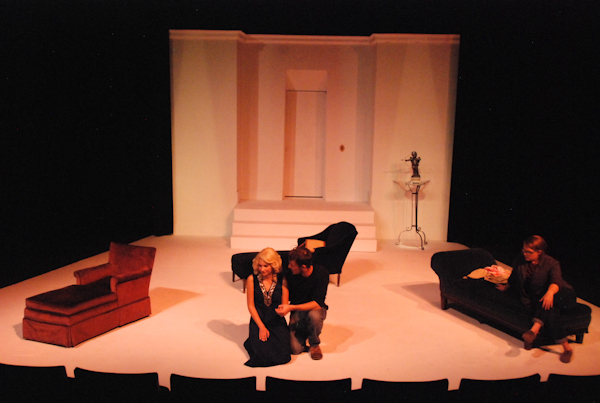Photo by: Henoc Kivuye
The emotional turmoil and confusion one might experience when residing in hell is brought to life in a play at Oklahoma Christian University.
“No Exit” follows the lives of three characters that are trapped in hell while they attempt to come to the conclusion of why they are there and how they will be tormented.
Associate Professor of Communications and Theater Phil Reagan is producing and directing the show. The play was cast in August, and rehearsals started at the beginning of the fall semester. Reagan has been a part of most Oklahoma Christian productions since 1979.
“I continue to direct because I love to watch actors grow into powerful storytellers and see audiences enjoy the stories told,” Reagan said. “As a community, we share in the experience of seeing and hearing meaningful story.”
Jean-Paul Sartre, who wrote the play ”No Exit,” was a French philosopher known for his views on existentialism. During his life he wrote many different plays, essays and novels. His work was mostly used as a way of expressing and exploring his philosophical ideas and views.
This play is one of his literary ventures on his philosophical concepts. Written in 1944, the play explores the experiences of three individuals trapped in hell.
“‘No Exit’ explores the choices that three people, who find themselves locked in a room together in what they believe to be hell, have made in their lives,” Reagan said. “The play expresses the truth that our character is comprised of a myriad of choices between good and evil made during our lifetime. In the last analysis, who we are is the sum total of all of our actions, as determined by our own God-given free will.”
Sophomore Drew Swadley said he is looking forward to the performance.
“I am excited about OC presenting ‘No Exit,’” Swadley said. “From what I have heard about the play it is very intriguing and can be used as an example in life. Being a Bible major, I spend a large portion of my time reading philosophy and theology. Sartre’s work really makes an audience think about what happens after death.”
Sartre untraditionally portrays hell as a locked living room. As the three characters attempt to figure out why they are in hell and how they are to be tormented, they soon come to the understanding that they will act as torturers for each other.
Sartre’s version of hell is an interesting one. There are no flames, devils or souls crying out in pain and agony; it is just a living room. The set is completely white with three chaise lounges occupying the floor and a tiny dangling light from the ceiling. This was Sartre’s personal idea of hell.
“No Exit” is a play intended to keep audiences guessing, supposing and questioning the outcome of the characters and their own lives.
Reagan strongly encourages people to attend the show.
“‘No Exit’ is a powerful story that shows how some human beings can deceive themselves and rather than taking responsibility for their own actions, will attempt to make their life choices someone else’s responsibility,” Reagan said.
Sartre shows how the mere presence of another person will torment an individual because subjectivity ultimately becomes competitive. In other words, a second person makes the first person feel like an object rather than a subject. The play also delves into Sartre’s idea of “bad faith,” or the refuge we all seek instead of facing the anguish and terror of our own existence.
“‘No Exit’ really causes one to think about their own individual future and what they want out of life currently and eternally,” sophomore Andrew Leingang, an actor in the play, said. “The parallels that the play draws are so profound and deep, from arguing a deep philosophical standpoint such as subjectivity versus competitive, you really start to think.”
The play famously concludes with one of Sartre’s most-quoted lines of all time: “Hell is other people.”














Be First to Comment